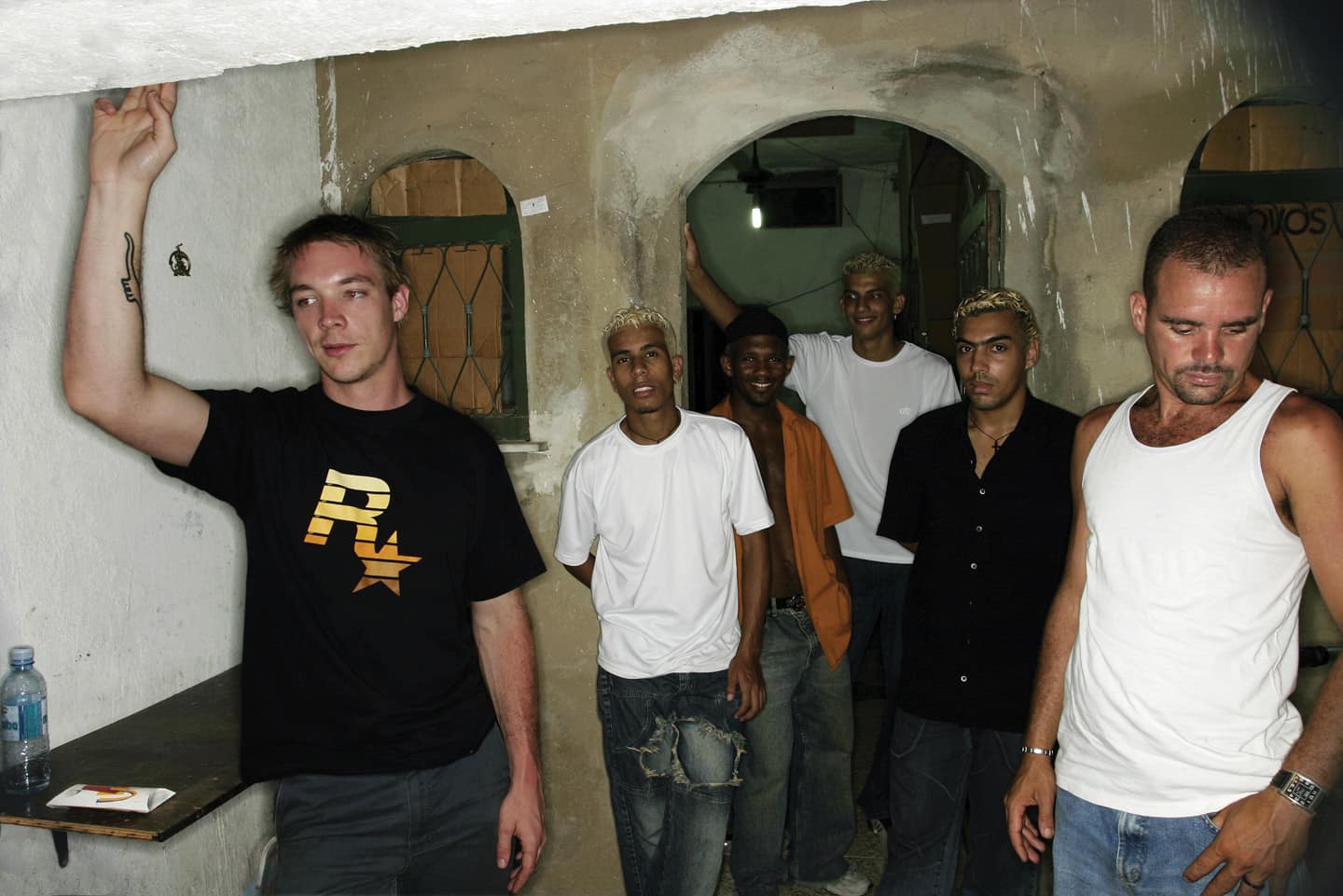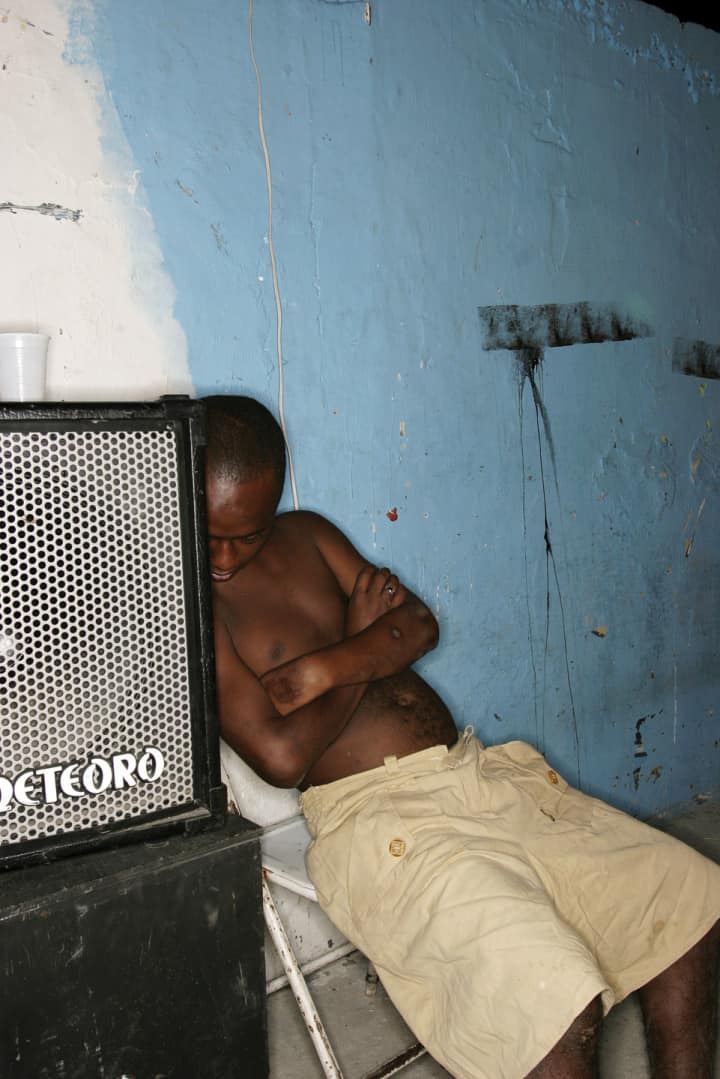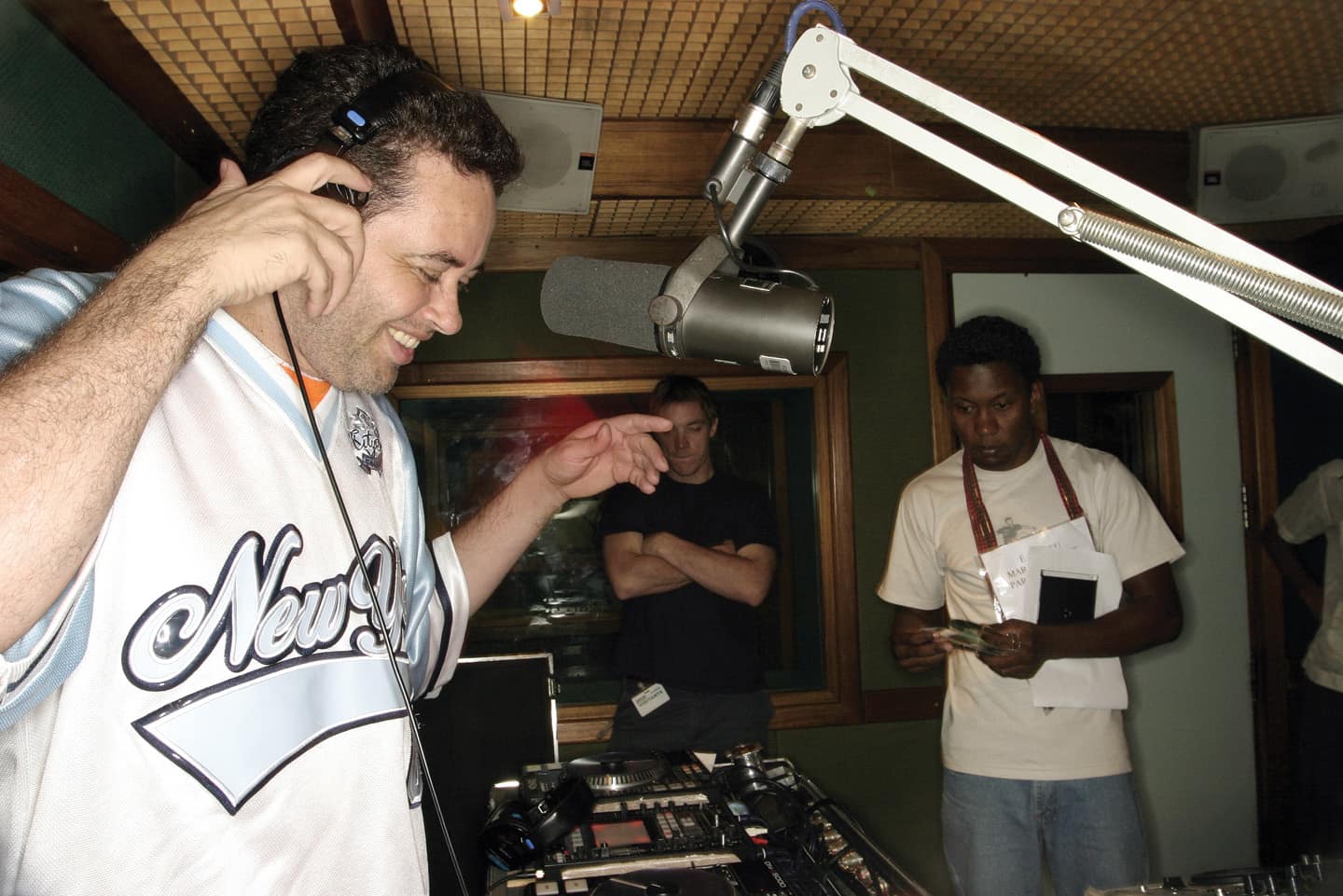
The FADER joined Diplo on a trio to Rio in 2004 and discovered the story behind his Favela on Blast mixtape.
In 2004, The FADER's then editor-in-chief Knox Robinson joined Diplo on a trip to Rio de Janeiro for The FADER issue 23.

"Let me get this straight," the email from Vaughn began. "You are essentially going to do a story following this guy—who wants to license some funk songs and put them out on a legitimate album—around Rio's favelas? Does this guy have any idea what a real favela is like? 14 year-old kids with AR-15s, AK-47s, and MAC-11s all around?
"Let me explain something," he continued. "Funk music is the REAL gangster rap of Brazil." Vaughn goes back and forth between LA and Brazil facilitating hip-hop DJ junkets and cultural film festivals; I figured he knew what he was talking about when he elaborated that because the musicians who make funk are usually linked to one of the two major gangs in Rio that control the entire city's drug trade, the music is inextricably tied up with drugs and murder and that it isn't played on the radio because it is the most violent, vulgar music imaginable. "The police can't even get into the realest of the real parts of the favelas," he continued. "They're all on hills and they have better weapons than the police—so there is no way in hell some random hipster who wants to put this music out is just going to roll up into a favela like, 'Can I talk to the guy rhyming on this song?'"

" Does this guy have any idea what a real favela is like? 14 year-old kids with AR-15s, AK-47s, and MAC-11s all around?"—Vaughn
In retrospect, it never got too bad. The photographer, a Brazilian I had linked with in NYC, only had guns pulled on him twice—no more than three times. But that was the story I wanted, the whole thing: I wanted to hear what this funk shit sounded like in a ghetto-ass club in a hood hidden in Rio de Janeiro. I wanted to know what happened when the lo-fi, scabrous beats shredded through the sound system, and I wanted to see for myself how people in the place got down to the percolating flow of rapped lyrics that had the unmistakable sound of the street. What did they do, exactly? And I wanted to know why it was called funk. To be sure, the music was funky in a millennial Kingston-Lagos-Addis Ababa-Tijuana-Baltimore-Detroit hot, hellacious urban hell type of funky—funky in a way that the music of those places sounds best coming out of egregiously massive speakers in tiny clubs and shitty beat-up speakers in shitty beat-up cars. That was the Rio funk I heard on a CD burn labeled simply "Your's Truly" that was floating around in NYC last year; the 21 tracks on the disc were crass productions of distorted mics and late '80s style rap flows, Miami bass-style snaky synth horns and raw, racing drum tracks with a few machine gun breaks, tink-tink techno touches and a sampled jaguar roar that made the music shockingly terrible and amazingly addictive. It sounded nothing like the funk of James Brown or George Clinton or even '70s Brazilian funk cats like Max B, Hyldon, or Tim Maia. I wanted the story, but a week later Vaughn emailed again: "Not to sound superficial, but fools who head up into favelas clearly on some gringo shit, looking like they don't belong, usually run into problems."
To be fair, Wesley Pentz is no random hipster on some gringo shit. Hipsters might know him as Diplo (as in "diplodocus"), half of the Philly-based Hollertronix DJ crew of the moment that's been blowing up by mixing (among other things) the Dirty South abject rap of Cash Money Millionaires' "Project Bitch" with the ineffable feyness of Soft Cell's "Tainted Love" at parties from London to LA; the weekend before we met up in Brazil at the end of January he was spinning at a Sundance Film Festival party sponsored by this magazine. I didn't know him personally, but shortly after I found out he was a link in the "Your's Truly" chain I heard he was going to Rio in search of the funk. Once we started swapping emails he told me he had been dutifully practicing his Portuguese and wanted to find the people responsible for the CD, which he said had been given to him by a weirdo pair of Brazilian girls at a music show; as a fresh, genre-smashing music, funk naturally appealed to him. He told me he was "trying to go out there with licensing contracts to get about ten or so artists to be down and fully comfortable to let me take tracks back to the US to do a compilation of the favela (electro) music. And eventually try to integrate it and maybe lacing up a big party in NYC for a release or something with those artists." I decided to follow him.

It's impossible to know when things fell apart—whether the wheels came off at some small moment during that week or so in Rio, or back in New York when it came time to piece it all together and weave some sort of gauzy hypertextual narrative linking race and sex and culture and technology and history and music in the context of Brazil's urban soundtrack. What I do know is what I heard and saw on Rio's funk scene—the funk scene of the favelas, not the imitation parties popping off for middle class kids at bars in Ipanema and Copacabana—is an uncharted underground of sex, drugs, music and dance with no discernible beginning or end. The whole thing was a never-ending party, the way the damned must party on certain rings of hell without realizing that their afterlives will be nothing but the dull ache of the soul trying to climb out of its cage. The people who live for it—funkeiros—seemed eager to leave their bodies. I saw manic eight year olds running high from huffing the bags of glue in their hands, and I saw grown men—well, 17 year-olds—passed out with their heads resting on speakers blasting so loudly the cases could barely contain the thrust of the volume. I saw two pairs of ten year-olds making out at a government-sponsored concert staged on a playing field in the middle of one slum (the strangest thing about it was the presence of government services in a favela, since the drug runners fund almost everything there, from schools to sambas to streetcleaning in the few favelas that had streets). Another night I turned around and saw a group of giddy teens chopping up impossibly white coke into mounds that seemed to be the size of their outstretched fingers before snorting it out of their cupped hands. By the last night I had heard enough of the same songs over and over to understand the basic vocabulary—at one show I watched a group of neighborhood girls with matching outfits and choreographed dance moves rap with a steely deroulement about being bitches with fat asses as they showed the crowd exactly what they meant.

Meaning: I kept my eyes open for as long as I could, thinking that I would catch a glimpse of what Caetano Veloso captured in the title of his memoir: a tropical truth. But while I saw a lot of crazy shit in the favelas I couldn't escape from knowing that I was merely sliding along the surface of the whole thing without figuring anything out—without figuring out what there was to figure out. The sun was already up on the beaches as I drove home at six or seven each morning totally wrecked, the straight world on its way to work and before passing out I would laugh that the parties we were running through were called balls—I was chasing Rio's funky balls.
Of course, Diplo didn't find out anything about "Your's Truly." It wasn't so much his lack of Portuguese that hindered his questioning; rather, once in Rio it's blindingly obvious the funk industry both above and below ground churns out hundreds of thousands of CDs a year, and a quick listen to any random disc available in a street market reveals that Rio Funk 2004 is layered and complex enough to make the rawness of the Miami Bass-style appropriations on "Your's Truly" seem quaint and old-timey. With current productions using the horns from the Rocky theme song chopped and doubled to make a beat, and MCs rapping over "Bittersweet Symphony" and "Rock The Casbah", Diplo's inquiries about the earlier music—even stuff a few years old—were met with blank looks.


Although there are a few funk groups with CDs of their own, most of the music is released on compilations based around a theme (an image of a girl in white spandex leaning over a set of turntables anchors a comp celebrating steatopygia) or groups from a particular favela, such as the City of God. The anonymous or abstract quality of the cover artwork suggests that in lieu of actual star power (and the videos and magazines and gossip shows that support it) the music is driven by DJ/producers and the songs they make and play at shows, rather than the people who rhyme on them.
The photographer for this story made contact with one of the biggest of these figures: DJ Marlboro. Marlboro hosts the "Big Mix" funk show on Rio's O Dia 100.5 FM every afternoon; the station's manager says there are 400,000 listeners at any given second during Marlboro's two-hour window. I'm not sure how such figures are calculated but it didn't seem inconceivable, and not just by the volume of calls into the station—Marlboro's "Big Mix" franchise extends to production and a network of parties in favelas up to two hours from Rio. While he spends most of his nights racing from one favela to the next and coming off cool once he gets there, Marlboro's ubiquity is cemented by a stable of young producers who play his parties and meet twice a week at his four-story home studio to play tracks from up-and-coming MCs in various favelas. The best candidates usually end up as MCs on Big Mix productions, which is a good way to score the momentary shine that arrives with the brief life span of a popular song.
 DJ Marlboro hosting his "Big Mix" baile funk show at Rio's Big O Dia 100.5.
DJ Marlboro hosting his "Big Mix" baile funk show at Rio's Big O Dia 100.5.
"People say it's all about drugs and guns, but this is the music of young people and poor people—it's their lives. People used to say the same thing about samba."—DJ Marlboro
Vaughn was right when he said the favelas are impenetrable. But Marlboro's credibility and celebrity gives him access where others would be shut out by the boys guarding the mouth of the favela and feeling compelled to buy a bag of coke from them to save face—or their ass. He's older than anyone else by a couple of decades, and at this stage in his career he's perfected the role of the beneficent patron, so rolling with him to funk balls is similar to what it must be like to go to NYC hip-hop clubs with Funkmaster Flex: with him you have access to everything, but you don't see everything.
"I've been doing funk balls since the late '70s. Back then we'd play American music like James Brown, Parliament, Brick," Marlboro says, explaining the roots of his work. "When the music changed in the '80s we started playing more electro, freestyle and techno. But the parties stayed the same, so people kept calling it funk.
"Nowadays funk has a bad reputation," he continued. "People say it's all about drugs and guns, but this is the music of young people and poor people—it's their lives. I'm trying to keep it positive. People used to say the same thing about samba."

At the end of all of it, I was glad to be getting out; I had looked at too much without seeing anything. Diplo ended up coming back a little early, too—he had gigs in Europe. On the flight back he put together a mix from a glut of funk CDs using Pro Tools on his laptop, and in London his record company burned several thousand copies of the mix so he could use them as promotion. The other day I went to Turntable Lab's chic downtown record spot and Favela on Blast was on the countertop display. The artwork was a photo Diplo had taken—the ten year-olds making out. I picked it up and said, "Oh—some Brazilian shit."
"Yeah, but not 'Brazilian' like you think,' said the clerk without looking up from the cash register's computer screen.

